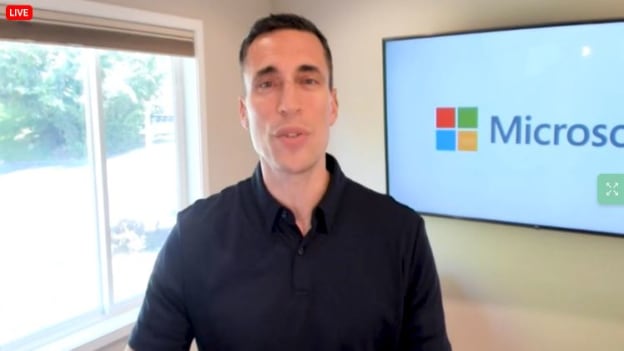The hybrid future will rewire organizations and change how work gets done: Microsoft’s Jared Spataro

“73 percent workers say that they want more flexible remote work options to continue post pandemic. But at the same time, a remarkable 67 percent of employees say they also want more in person collaboration,” said Jared Spataro, Corporate Vice President at Microsoft quoting the company’s annual work trend index study, in his opening address at the People Matters EX conference.
“About 80 percent of managers say that they expect more flexible work from home policies after the pandemic is over. And at the same time, they want to be able to connect with their colleagues,” he added.
This parallel set of expectations has led to a “hybrid work paradox.” This shift also means that there’s increased complexity.
“To compete in this new hybrid world, we believe leaders will need to embrace flexibility when, where and how people work. And to do that, organizations will likely need a new operating model to fundamentally rewire their organization and how work gets done,” Jared said. If businesses want to succeed, they need to build their new operating model across people, places and processes — to empower employees to thrive in a hybrid world of work.
Here are some of the key takeaways from his session:
-
Empowering managers
As the pandemic raged on, managers had a crucial role to play in engaging workers. At Microsoft, Jared noted, "managers are equipped with skills needed to lead the transition and empowered with the decision making authority with the help of technology tools." For example, managers have the authority to approve when individuals can work from home beyond 50 percent corporate policy. They can also authorize new home office equipment purchases for work etc. Managers are also encouraged to have conversations with their dreams to develop team specific or organization wide norms. -
The role of collaborative technology
What employees missed out while working remotely was informal banter that led to building social capital and action. Microsoft Teams, Jared said became a point of collaboration tool where everyone could meet, chat, call and collaborate. “It’s just as mission critical to keep people connected and keep the work moving,” Jared said.
“From developer productivity to shift scheduling for frontline workers, Teams became the organizing layer for all the ways that people at Microsoft work, learn and collaborate. With features like persistent chat and meeting recordings and transcripts built right into the experience. It's central to both synchronous and asynchronous collaboration and communication that are going to be required for this new flexible work schedule,” he added.
-
Reimagine employee experience
Over the past year, companies have also found that employees struggle with work life balance. With high levels of burnout, wellbeing became a critical focus area. “As leaders, we need to accept that in the new world of work, the digital experience is the employee experience,” Jared noted.
Speaking of new innovations in the company’s product stack, Jared noted that Microsoft Viva was designed with a focus on four modules – connections, insights, topics and learning.
Connections is a technology experience allowing employees to stay engaged, informed, no matter where employees are. With insights, critical information is surfaced for both employees and their managers. For individuals, it's helping them improve work habits, and for managers insights help practically engaged teams at risk of burnout, and helps them develop more sustainable work practices.
Viva learning is geared at employee professional growth and learning on-the-job within Microsoft Teams. And Viva topics leverages AI to magically connect employees to knowledge and experts in the context of your work. “Viva topics is helps you learn in the flow of work. You can think of it as the marriage between Wikipedia and AI,” Jared noted. -
Tackling digital exhaustion
Research by Microsoft has shown that digital exhaustion is widely prevalent and it's pushing people to a breaking point.“Addressing digital exhaustion must be an imperative for leaders everywhere in this new world. And we've got to find new and inventive ways to do it.” Jared noted.
A new study published by Microsoft looked at the impact of back to back video calls on the brain and the stress load our brains carry. It found that even short breaks of five or 10 minutes can help reduce anxiety and just literally reset cognitive function. To help, the company has introduced a new feature in Outlook, which now lets users set meeting defaults to create an auto five minute break whatever length you choose between meetings to make an organization-wide change. “It really is small changes like this that can have a big impact on well being,” Jared said.
Another innovation that the company highlighted was team meeting rooms that bridge the gap between physical and digital. Teams rooms are designed so even if employees are working from home they feel included as part of the meeting as those in the room. And for spaces using a traditional whiteboard, the participants can use a content camera to make sure it can always be seen by everyone. Whether employees are working from home or not, one can have a seat at the table and be fully engaged and able to contribute. -
Addressing security issues
“The threat landscape has never been more complex or challenging or frankly more intense,” Jared said. From tracking over 40 nation state actors, to 140 different threat groups, the intensity of the threat is only set to rise.From device security, data, corporate networks to leveraging AI, there’s a need for zero trust architecture that’s now more important than ever before. And companies need to invest wisely.
As the new world of work emerges, Jared reminded the audience that although it's not possible to have all the answers. But sharing progress and learning together is going to be critical to navigate the hybrid world of work.












